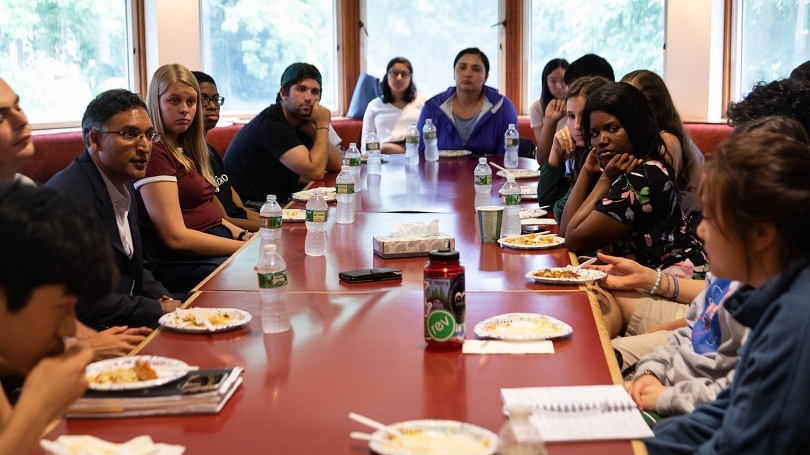
- Public Policy
- Leadership
- Funding
- News & Events
- About the Center
Back to Top Nav
Back to Top Nav
Back to Top Nav
Back to Top Nav
During a visit to campus this summer, former Acting Solicitor General Neal Katyal ’91, gave a public lecture on “The Supreme Court and National Security Law” at the Nelson A. Rockefeller Center. While on campus, Katyal also participated in a student dinner, where he touched on his time at Dartmouth, on his self-described “circuitous” career path, and on his values.
Currently the law professor at Georgetown University and a partner with Hogan Lovells, LLP, Katyal thinks that his time at Dartmouth influenced his career in two ways. First, after enjoying his four years at the College, he was ready to “hit the books hard” in law school, and second, he learned to value collaboration in academic and professional settings.
“The Dartmouth education is far more collegial and about learning from each other. I’ve always tried to bring that spirit into all the teams I build, whether that’s in the government or at Georgetown or in the private sector,” he said.
His favorite Dartmouth memories include Sophomore Summer and his time spent with the debate team, of which he was an active member. Throughout his college career, Katyal was certain he would become a history professor, a fact he now finds entertaining.
“People think ‘I’m going to be X when I graduate from Dartmouth’ when statistically, you’re very likely to be not X and maybe the opposite of X,” he said.
Katyal shared with the audience how he came to be a practicing lawyer. After one postgrad year spent coaching the Dartmouth debate team, he attended Yale Law School with the ultimate goal of becoming a law professor. He was teaching law at Georgetown University when President George W. Bush announced his attention to establish a fully separate trial system for Guantanamo Bay detainees.
Convinced this measure was unconstitutional, he pursued legal action, filing a Supreme Court case on behalf of Osama bin Laden’s former chauffer Salim Ahmed Hamdan. He ultimately won this case, thereby bringing constitutional protections to Guantanamo. This case was pivotal for him in that it effectively launched his career as a practicing lawyer and in that it led him to reflect on his beliefs and motivations. When he met with the defendant, Hamdan asked him why he was helping him. Katyal remembers struggling to find the words to answer.
In that moment, he realized that he strongly believes that the United States is and should remain a place where people—even foreign drivers of infamous terrorists—can be treated fairly. As a first generation American, he feels that he is in a unique position to appreciate and uphold the standard of equity inherent to the American judicial system.
Katyal touched briefly on current events, urging the audience to give Trump the benefit of the doubt and to rest assured the court will protect us if necessary. He expressed support for the Supreme Court nominations of Neil Gorsuch and Brett Kavanaugh.
Katyal offered this advice to current Dartmouth students.
“I wish students would take more intellectual risks,” he said. “I was afraid of economics. I was worried that if I took [microeconomics], I was going to get a bad grade. I wish that someone said to me that this is your chance to really learn.”
On a similar note, he encouraged to students to take classes unrelated to their ultimate career interests.
“If you’re really thinking about going to law school, don’t take more than one law course before you graduate. You’re going to learn all that anyways,” he said.
Written by Eliza Jane Schaeffer ’20, Rockefeller Center Student Program Assistant for Public Programs
The views and opinions expressed, and any materials presented during a public program are the speaker’s own and do not necessarily represent the views and opinions of the Rockefeller Center or constitute an endorsement by the Center.